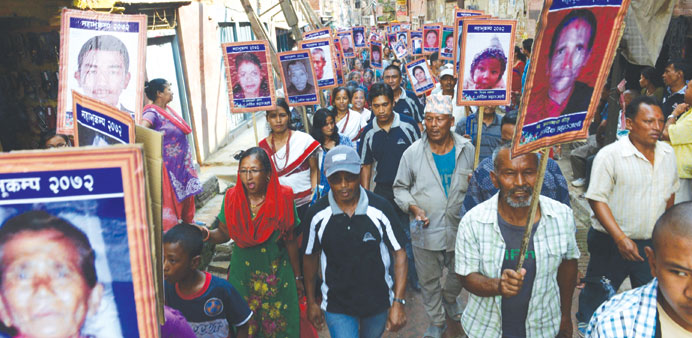Nepalese mourners attend a memorial rally in Bhaktapur, on the outskirts of Kathmandu, holding photos of 343 people that perished in the district during the April earthquake yesterday.
Reuters
Kathmandu
Two months after foreign countries and international agencies pledged $4.1bn to help Nepal recover from its worst natural disaster, the government has yet to make arrangements to receive the money and has spent nothing on reconstruction.
The UN estimates almost 3mn survivors of twin earthquakes in April and May — around 10% of the Himalayan nation’s population — need shelter, food and basic medical care, many in mountainous, hard-to-reach areas.
Govind Raj Pokharel, chief executive officer of the newly created National Reconstruction Authority, said the government was unlikely to start spending the money until October at the earliest because of delays in approving plans and concerns about starting building work in the monsoon season. “The government’s response has been slow. I accept that,” said Pokharel.
Nepal has been criticised for its chaotic response to the quakes that killed almost 9,000 people. The country failed to adequately prepare even though experts had predicted an earthquake was likely. And then the government struggled to cope with relief. Four months later, many partially damaged buildings in Kathmandu are still standing and rubble is strewn across public parks.
Tens of thousands of people are living in plastic tents, preyed upon by flies and mosquitoes, with muddy paths and no drains.
Maili Pariyar, 50, knitting a purse to sell outside her tent, said she only received food and tent materials from aid agencies. She has not been given anything by the government.
“We have lost everything. We are desperate,” she said. “How much longer do we have to wait for help?”
Pokharel said the government had failed to spend any money because ministers had still not signed off on rebuilding and aid distribution plans.
He said the government made an error by attempting to pass a contentious constitution that will create a new political system and divide the country into new regions, a decision that has led to deadly clashes.
The government argues the overhaul will help reconstruction in the long run by creating greater stability. “We would have liked it if they concentrated on the reconstruction first,” Pokharel said. “That would have been better.”
Jamie McGoldrick, the UN Resident and Humanitarian Co-ordinator for Nepal, said the government had been sluggish. “The government needs to get going,” he said. “The next big challenge is to ensure that people living in tents are prepared for the winter.”
After a two-month wait, Pokharel was appointed to head the reconstruction authority two weeks ago. He is now based in a government office that oversees printing because the earthquake damaged other buildings.
“We have lost time and now we need to catch up,” he said.

